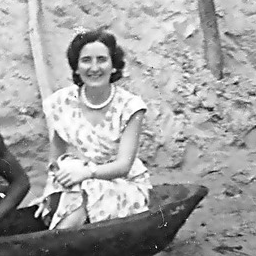Patricia Horne facts for kids
Quick facts for kids
Patricia Horne
|
|
|---|---|

in Nigeria in the 1950s
|
|
| Born | c. 1929 |
| Alma mater | University College Dublin |
| Known for | Overseas medical work |
Patricia Horne was born around 1929 in Ireland. She is a medical doctor who started her career helping people in Nigeria in the 1950s. Years later, in the 1990s, she returned to Africa to help with the AIDS crisis in Zambia.
Contents
Becoming a Doctor: Patricia's Journey
Patricia Horne was born around 1929, along with her twin sister, Margaret. Her family had a strong connection to medicine. Her grandfather, Andrew Horne, helped start the Holles Street maternity hospital in Dublin. Patricia's mother also studied medicine and worked there. Her father was a doctor in the army before he married her mother.
From a young age, Patricia wanted to be a surgeon. She and her sister went to secondary school in Waterford.
University Days and Sports Success
Patricia went on to study medicine at University College Dublin (UCD). While at university, she was a talented field hockey player. She led the UCD women's hockey team to win the Irish Senior Cup in 1951. This was a huge achievement, as UCD didn't win the cup again for another 58 years!
Patricia graduated as a doctor in 1955. Her first job was as a surgeon in Cashel, County Tipperary. In those days, it was often easier for women doctors in Ireland to work in public health. So, following her mother's example, Patricia also earned a special diploma in Public Health. This training helped her understand how to keep whole communities healthy.
Helping People Around the World
Patricia Horne always wanted to work overseas and help people in other countries. In 1957, she got a two-year job at a missionary hospital in Nsukka, Nigeria. This hospital was run by the Holy Rosary Sisters. At the time, Nigeria was just three years away from becoming independent from Britain.
Life in a Remote Hospital
The hospital in Nsukka was in a remote area. It didn't have electricity or running water, which made medical work very challenging. Diseases like tuberculosis and yaws were very common there. Patricia was the only doctor at the hospital, working every single day. A big part of her job was helping women with childbirth and other related medical care.
After two years, Patricia returned home to Ireland. A back injury meant she could no longer work as a surgeon. She then decided to study psychiatry, which is the field of mental health. She worked in Ireland as a psychiatrist until she retired in 1994.
Returning to Africa: The AIDS Crisis
Even after retiring, Patricia Horne felt called to help again. She returned to Africa, this time to Monze, Zambia, where she worked for six more years. In the 1990s, the AIDS epidemic was a huge crisis in Zambia. Hospitals were dealing with many patients who had malaria and tuberculosis linked to AIDS. Patricia played an important role in helping people during this difficult time.
 | Janet Taylor Pickett |
 | Synthia Saint James |
 | Howardena Pindell |
 | Faith Ringgold |

